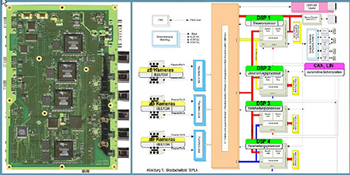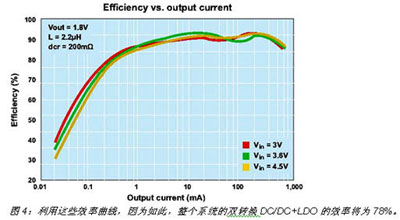本文介绍了DM37x系列主要特性,功能方框图和AM/DM37x评估模块(EVM)功能方框图,EVM 主板电路图,处理器模块电路图以及电源模块电路图。
TI 公司的DM37x系列是高性能应用处理器,基于增强的器件架构和采用TI的45nm工艺技术,与CortexTM-A8 Sitara 和OMAP处理器兼容,MPU子系统,高达1-GHz ARM CortexTM-A8内核,NEON SIMD协处理器,高性能图像,视频,音频(IVA2.2™)加速子系统,高达800-MHz TMS320C64x+™ DSP核,具有EDMA控制器(128个独立通路)以及视频硬件加速器,主要用在手提数据终端,导航,汽车娱乐,游戏,医疗图像,家庭自动化,工业控制,测试测量和单板机。
This DM3730/25 Applications Processor data manual presents the electrical and mechanical specifications for the DM3730/25 Applications Processor. The information contained in this data manual applies to both the commercial and extended temperature versions of the DM3730/25 Applications Processor unless otherwise indicated. It consists of the following sections:
• A description of the DM3730/25 terminals: assignment, electrical characteristics, multiplexing, and functional description
• A presentation of the electrical characteristics requirements: power domains, operating conditions, power consumption, and dc characteristics
• The clock specifications: input and output clocks, DPLL and DLL
• A description of thermal characteristics, device nomenclature, and mechanical data about the available packaging
The device can support numerous HLOS and RTOS solutions including Linux and Windows Embedded CE which are available directly from TI.
DM37x主要特性:
DM3730/25 Applications Processor:
Compatible with OMAP™ 3 Architecture
MPU Subsystem
Up to 1-GHz ARM CortexTM-A8 Core
NEON SIMD Coprocessor
High Performance Image, Video, Audio (IVA2.2™) Accelerator Subsystem
Up to 800-MHz TMS320C64x+™ DSP Core
Enhanced Direct Memory Access (EDMA) Controller (128 Independent Channels) Video Hardware Accelerators
POWER SGX™ Graphics Accelerator (DM3730 only)
Tile Based Acrchitecture Delivering up to 20 MPoly/sec
Universal Scalable Shader Engine: Multi-threaded Engine Incorporating Pixel and Vertex Shader Functionality
Industry Standard API Support: OpenGLES 1.1 and 2.0, OpenVG1.0
Fine Grained Task Switching, Load Balancing, and Power Management
Programmable High Quality Image Anti-Aliasing
Advanced Very-Long-Instruction-Word (VLIW) TMS320C64x+™ DSP Core
Eight Highly Independent Functional Units
Six ALUs (32-/40-Bit); Each Supports Single 32- bit, Dual 16-bit, or Quad 8-bit, Arithmetic per Clock Cycle
Two Multipliers Support Four 16 × 16-Bit Multiplies (32-Bit Results) per Clock Cycle or Eight 8 × 8-bit Multiplies (16-Bit Results) per Clock Cycle
Load-Store Architecture With Non-Aligned Support
图1。DM3730/25 功能方框图
AM/DM37x评估模块(EVM)
Developed with Mistral, the AM/DM37x Evaluation Module (EVM) enables developers to immediately start evaluating AM37x or DM37x processors (DM3730, DM3725, AM3715, AM3703) and begin building solutions such as portable multimedia, portable data terminals, portable medical equipment, portable communications, home and building automation, navigation systems, test and measurement, smart displays and human machine interaction (HMI) industrial interfaces amongst many others.
AM/DM37x EVM includes
Hardware
DM3730 Processor Module
1GHz ARM Cortex-A8 Processor
800MHz DSP processor with IVA video accelerators
256MB MDDR/512MB NAND
TPS64102 Power Management Module
WL127 WLAN/Bluetooth Daughter Card
3.7" LCD Touchscreen
EVM Base Board
Ethernet, SD/MMC, UARTs, USB Host and OTG, Audio and Video Output, JTAG, Keypad, and expansion USB, Serial, and Power cables
Universal power supply with regional adapter
Stylus and USB SD Card Reader
Software
AM37x and DM37x Software Development kits provided via included 4GB SD Card
Documentation
AM/DM37x EVM Quick Start Guide
Linux SDK SD card content sheet
Software license agreement
Software and soft copy documents
AM/DM37x EVM Hardware User’s Guide (SD card)
AM37x and DM37x Software Developer’s Guide (SD card)
AM37x and DM37x Software Developer’s Kit (SD card)
Sourcery G++™ evaluation tools from CodeSourcery
Ubuntu Linux host distribution
The AM/DM37x EVM is based on TI’s AM/DM3730 applications processor.
The Hynix memory is interfaced to the AM/DM3730 processor via Package-On-
Package technology. The Hynix PoP memory supports 2Gbit NAND flash and 2 Gbit Mobile DDR SDRAM. The DDR memory and NAND Flash are connected to SDRAM controller (SDRC) and General Purpose memory Controller (GPMC) interfaces of processor respectively.
It is also equipped with a 3.7” TFT LCD module. This LCD Module is interfaced to the Display SubSystem (DSS) interface of the processor.
Analog Video outputs of EVM support both Composite TV (CVBS) output and Svideo output on the main board. The CVBS or S-Video Outputs are available on respective connector by default.
AM/DM37x EVM supports multiple video input options through AM/DM3730’s camera port. Any one of the below interface shall be active at a given point of time.
1. S-Video Input, digitized through Video decoder (TVP5146PFP)
2. Composite Video Input through Video decoder (TVP5146PFP)
3. Component Video Input through Video decoder (TVP5146PFP)
4. Camera Interface – 26-Pin camera connector to support Micron Camera Module
5. Camera Interface – Provision for LI-3M02CM camera module
The EVM has a SD/MMC slot using SD/MMC1 interface on the main board. And the SD/MMC2 interface is routed to the expansion connector.
The EVM has a 10/100 Mbps Ethernet interface using an external MAC/PHY controller LAN 9220 which is interfaced to the AM/DM3730 via the GPMC interface.
The EVM supports three UART (UART 1, 2 and 3) interfaces via two serial ports on the main board.
High Speed USB OTG interface is supported on the EVM Main Board via an onboard external USB transceiver.
High Speed USB HOST (USB2) interface is supported on the EVM Main Board via an onboard external USB transceiver.
One Stereo Line IN and Stereo Headset OUT audio interface is supported through the audio codec on the TPS65950 device. The audio codec on the power module is controlled by internal registers that can be accessed through high-speed I2C interface.
The EVM includes 11 status LEDs, 2 user DIP switches and 16 push button switches.It supports the standard 14-pin JTAG and ETM debug interfaces. The EVM is designed to work with TI’s Code Composer Studio development, or standard GDB tool environments. For more details refer Getting Start Guide.
The EVM is powered by a +5V external power supply. The TPS65950 power management device provides the required CPU core voltages and IO voltages.
The EVM can also be powered using an external Lithium Ion/Polymer battery.(Battery not supplied with EVM). RTC is supported through a coin cell.
图2。AM/DM37x EVM评估模块功能方框图
图3。AM/DM37x EVM评估模块外形图(顶视图)
AM/DM37x EVM评估模块系统包括:
• EVM 主板:The EVM Main Board provides the peripheral interfaces and connectors for the system along with Processor board and Power Module. In the AM/DM37x EVM architecture, the Processor Module connector pin outs and functions are defined by the Main Board. The following sections describe about the various interfaces on the EVM main board.
• 处理器模块:AM/DM3730 Processor Module consists of AM/DM3730 Processor with PoP memory Hynix (H8KDS0UN0MER-4EM) .
• 电源模块:The Power Module has TPS65950 Power and Audio companion device, which is responsible for AM/DM3730 power management, clock and reset generation. This can support multiple power supply designs in the EVM architecture. Communication to the AM/DM3730 Processor is via the High Speed I2C interface for voltage scaling, configuration, and ON/OFF control.
图4。AM/DM37x EVM主板电路图(1)
图5。AM/DM37x EVM主板电路图(2)
图6。AM/DM37x EVM主板电路图(3)
图7。AM/DM37x EVM主板电路图(4)
图8。AM/DM37x EVM主板电路图(5)
图9。AM/DM37x EVM主板电路图(6)
图10。AM/DM37x EVM主板电路图(7)
图11。AM/DM37x EVM主板电路图(8)
图12。AM/DM37x EVM主板电路图(9)
图13。AM/DM37x EVM主板电路图(10)
图14。AM/DM37x EVM主板电路图(11)
图15。AM/DM37x EVM主板电路图(12)
图16。AM/DM37x EVM主板电路图(13)
图17。AM/DM37x EVM主板电路图(14)
图18。AM/DM37x EVM主板电路图(15)
图19。AM/DM37x EVM主板电路图(16)
图20。AM/DM37x EVM主板电路图(17)
图21。AM/DM37x EVM主板电路图(18)
图22。AM/DM37x EVM主板电路图(19)
图23。AM/DM37x EVM处理器模块电路图(1)
图24。AM/DM37x EVM处理器模块电路图(2)
图25。AM/DM37x EVM处理器模块电路图(3)
图26。AM/DM37x EVM处理器模块电路图(4)
图27。AM/DM37x EVM电源模块电路图(1)
图28。AM/DM37x EVM电源模块电路图(2)
图29。AM/DM37x EVM电源模块电路图(3)
 电子发烧友App
电子发烧友App






















评论